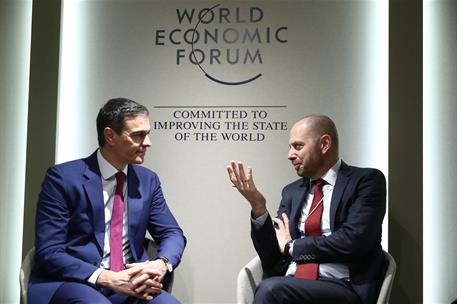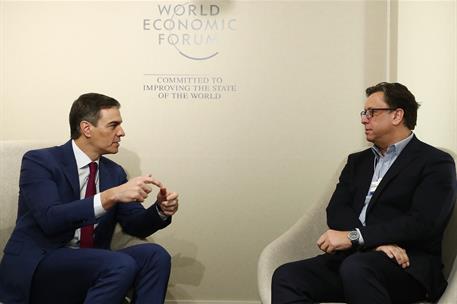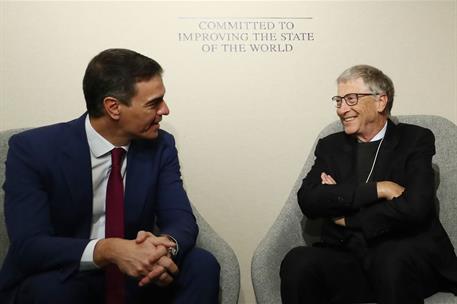The President of the Government of Spain attends the World Economic Forum in Davos
Pedro Sánchez calls on companies to improve workers' purchasing power and defend democracy
President's News - 2024.1.17
Images of the speech by the President of the Government of Spain | Pool Moncloa / Diego del Monte - 2024.1.16
Davos (Switzerland)
The President of the Government of Spain, Pedro Sánchez, has taken part in the World Economic Forum in Davos, where he has had an intense agenda of bilateral meetings with some of the largest companies in the technology, energy and health sectors. At the end of the day, he delivered his keynote speech to the Forum.
In his speech, the president stated the need to create a new paradigm of prosperity that differs from that promoted by neoliberal policies "which have been shown not to work". To achieve this, it is essential to have the help of business, which he described as "essential for the growth and well-being of a country". President Sánchez focused on the need for public-private partnership to ensure the prosperity of "those middle and working classes that have not always benefited from the economic transformations of recent decades".
A betrayal, the president explained, which is the seed of the rise of the extreme right, and he called on companies "to not let themselves be carried away by this reactionary wave" and to get involved in helping raise the purchasing power of workers, curb the climate emergency and defend democracy. "In short: help us to give people a better life," said Sánchez.
A new economic and social orthodoxy that must be based on knowledge and tools that favour "combining economic growth with environmental sustainability and prosperity for all".
In this respect, the president of the Government of Spain advocated the example of Spain as a model that "has shown that it is possible to strengthen the welfare state and underpin its sustainability at the same time". Sánchez argued that creating wealth and improving the conditions of the working class are not incompatible, and that in order to follow this path towards a "new prosperity" it is essential to have the support of companies and the development of new technologies.
In this sense, Artificial Intelligence "will be good, necessary and will make our lives better", said the president of the Government of Spain, "but this should not make us ignore its threats". For this reason, he called for global regulation, minimum governance that protects the fundamental rights of citizens and tackles "cyber attacks, deep fakes and toxic lies that threaten our democracies". Dangers, he said, which society itself senses and which have become fears that need more attention than "the empty promises of some Silicon Valley gurus, who are more interested in gaining followers or climbing the Forbes millionaire list than in the real progress of humanity". Because, as the president continued, "those of us who learned not to believe in the invisible hand of the market cannot now profess blind faith in the invisible hand of Artificial Intelligence".
Within the necessary regulation of AI, Pedro Sánchez also wanted to reaffirm the leading role that Spain is seeking in the current industrial revolution. "We have launched a strategic plan with more than 12.5 billion euros to promote semiconductor manufacturing". And that the conditions of talent, clean energy and stability make Spain "a paradise for companies that want to prosper through innovation".
During his speech, the president of the Government of Spain also stressed Spain's commitment to international solidarity and multilateralism. The principles of a system that today is threatened by "those who promote fragmentation, intimidation or the use of force to impose their interests" and pointed to the war in Ukraine as the greatest example of instability for the international order. He also mentioned the conflict in Syria, which "this year alone has taken 4,000 lives". Not forgetting the most recent one; Gaza, "where in just 100 days, some 24,000 people have died," he said.
The president stressed Israel's right to defend itself against Hamas' "vile and monstrous terrorist attack", but demanded respect for international humanitarian law. For this reason, he reiterated the need for an immediate ceasefire and the convening of a peace conference to implement a definitive conclusion that includes the recognition of the existence of two states, Israel and Palestine, so that they can live together in peace and security.
A conflict, moreover, with implications for the security of global supply chains. "It is about trade, prosperity and stability in the Middle East as a whole; in short, the continuity of the multilateral order," he warned.
The president of the Government of Spain was also able to convey this vision to the most influential figures in Middle East affairs at the Informal Gathering of World Economic Leaders (IGWEL) moderated by the President of the World Economic Forum, the Norwegian Børge Brende.
In this closed-door meeting, he also stressed that Spain is a country firmly committed to international peace, security and prosperity.
Bilateral statements by the president of the Government of Spain at the Davos Forum
 Meeting between the President of the Government of Spain, Pedro Sánchez, and the co-president of the Bill & Melinda Gates Foundation, Bill Gates, in Davos (Switzerland) | Pool Moncloa/Fernando Calvo
Meeting between the President of the Government of Spain, Pedro Sánchez, and the co-president of the Bill & Melinda Gates Foundation, Bill Gates, in Davos (Switzerland) | Pool Moncloa/Fernando Calvo
The President of the Government of Spain has had an intense agenda during his stay in Davos, with meetings with the CEOs of some of the world's leading technology companies, such as Intel and Cisco, with whom he highlighted Spain's strategic plan to boost semiconductor manufacturing. The president of the Government of Spain also met with the CEO of Siemens Energy, as well as with the CEOs of Fujitsu and the pharmaceutical company Sanofi.
Throughout his day, the president of the Government of Spain met with Bill Gates, founder of Microsoft and major philanthropist and activist in the fight against disease and climate change, with whom he pledged to continue working together through the Gates Foundation.
The President of the Government of Spain completed his programme at the World Economic Forum with an informal meeting with representatives of the large Spanish companies present in Davos, with the aim of exchanging views on issues relating to the progress of the world economy, technological challenges and business prospects, a traditional meeting that has been repeated in previous editions.
Non official translation










